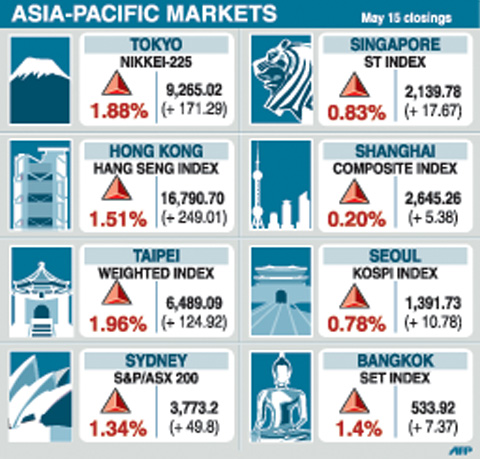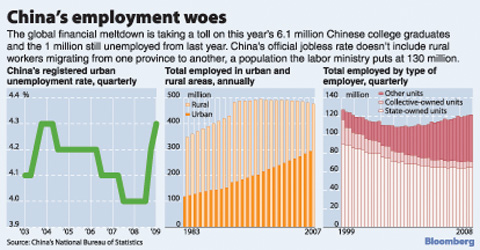Asian stocks fell this week as investors sold shares trading at their most expensive valuations in five years on concerns that the economy and corporate profits will take longer than expected to recover.
Hitachi Ltd, Japan’s third-largest chipmaker, tumbled 17 percent after forecasting a loss. Rio Tinto Group, the world’s third-largest mining company, slumped 14 percent after London’s Telegraph newspaper reported the company may sell shares. China Construction Bank Ltd (中國建設銀行), the world’s No. 2 lender by market value, dropped 8.8 percent as Bank of America Corp sold a stake.
“All positive news has already been priced,” said Masaru Hamasaki, a senior strategist at Toyota Asset Management Co, which oversees the equivalent of US$3.3 billion. “We need solid evidence the economy is indeed recovering to go up any further.”

The MSCI Asia-Pacific Index fell 0.7 percent to 97.28 in the past five days, ending a two-week, 9.5 percent advance. Speculation the global economy is recovering sent the gauge to the highest since Oct. 7 on Monday. The average valuation of its companies is 33 times trailing earnings, the highest level since 2004, according to data compiled by Bloomberg.
Cautious sentiment is expected to affect Taiwanese shares next week after today’s pro-independence protests against the China-friendly Chinese Nationalist Party (KMT) government, dealers said on Friday. Worries linger over a possible prolonged standoff and even violence as the Democratic Progressive Party also plans an all-night sit-in protest in front of the Presidential Office, they said.
“Political conflicts are the last thing the stock market wants to have,” Grand Cathay Securities Corp (大華證券) analyst Mars Hsu said.

Investors are also keeping a close eye on first-quarter GDP data scheduled for release on May 21, and waiting for government comments on the economic outlook for the rest of the year, they added.
The market is expected to face stiff technical barriers as it moves closer to 6,500-6,600 points next week, while ample liquidity may lend some support to prices at around 6,300, dealers said. In the week to Friday, the weighted index fell 94.78 points, or 1.44 percent, to 6,489.09 after a 9.86 percent increase the previous week.
Average daily turnover stood at NT$170.52 billion (US$5.18 billion), compared with NT$211.87 billion a week ago.
Hsu said the market’s recent significant gains have paved the way for volatility in the short term.
“Many investors may use such political factors as an excuse to cut positions for profit,” Hsu said.
Other markets on Friday:
KUALA LUMPUR: Up 0.2 percent. The Kuala Lumpur Composite Index gained 2.22 points to 1,014.21.
BANGKOK: The SET gained 7.37 points, or 1.4 percent, to 533.92.
MANILA: Up 1.97 percent. The composite index rose 44.47 points to 2,308.70.
WELLINGTON: Up 0.53 percent. The NZX-50 index rose 14.78 points to 2,790.90.
MUMBAI: Up 2.53 percent. The 30-share SENSEX gained 300.51 points to 12,173.42.

MORE VISITORS: The Tourism Administration said that it is seeing positive prospects in its efforts to expand the tourism market in North America and Europe Taiwan has been ranked as the cheapest place in the world to travel to this year, based on a list recommended by NerdWallet. The San Francisco-based personal finance company said that Taiwan topped the list of 16 nations it chose for budget travelers because US tourists do not need visas and travelers can easily have a good meal for less than US$10. A bus ride in Taipei costs just under US$0.50, while subway rides start at US$0.60, the firm said, adding that public transportation in Taiwan is easy to navigate. The firm also called Taiwan a “food lover’s paradise,” citing inexpensive breakfast stalls

TRADE: A mandatory declaration of origin for manufactured goods bound for the US is to take effect on May 7 to block China from exploiting Taiwan’s trade channels All products manufactured in Taiwan and exported to the US must include a signed declaration of origin starting on May 7, the Bureau of Foreign Trade announced yesterday. US President Donald Trump on April 2 imposed a 32 percent tariff on imports from Taiwan, but one week later announced a 90-day pause on its implementation. However, a universal 10 percent tariff was immediately applied to most imports from around the world. On April 12, the Trump administration further exempted computers, smartphones and semiconductors from the new tariffs. In response, President William Lai’s (賴清德) administration has introduced a series of countermeasures to support affected

CROSS-STRAIT: The vast majority of Taiwanese support maintaining the ‘status quo,’ while concern is rising about Beijing’s influence operations More than eight out of 10 Taiwanese reject Beijing’s “one country, two systems” framework for cross-strait relations, according to a survey released by the Mainland Affairs Council (MAC) on Thursday. The MAC’s latest quarterly survey found that 84.4 percent of respondents opposed Beijing’s “one country, two systems” formula for handling cross-strait relations — a figure consistent with past polling. Over the past three years, opposition to the framework has remained high, ranging from a low of 83.6 percent in April 2023 to a peak of 89.6 percent in April last year. In the most recent poll, 82.5 percent also rejected China’s

PLUGGING HOLES: The amendments would bring the legislation in line with systems found in other countries such as Japan and the US, Legislator Chen Kuan-ting said Democratic Progressive Party (DPP) Legislator Chen Kuan-ting (陳冠廷) has proposed amending national security legislation amid a spate of espionage cases. Potential gaps in security vetting procedures for personnel with access to sensitive information prompted him to propose the amendments, which would introduce changes to Article 14 of the Classified National Security Information Protection Act (國家機密保護法), Chen said yesterday. The proposal, which aims to enhance interagency vetting procedures and reduce the risk of classified information leaks, would establish a comprehensive security clearance system in Taiwan, he said. The amendment would require character and loyalty checks for civil servants and intelligence personnel prior to